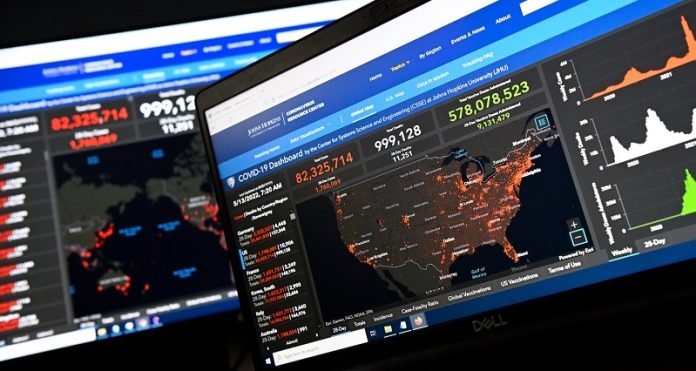
Johns Hopkins University & Medicine’s Coronavirus Resource Center ceased collecting and reporting COVID-19 data on March 10, 2023.
That’s three years after the institution embarked on the unprecedented effort of publicly tracking and analyzing an unfolding pandemic in real-time.
The pioneering public service has operated since the novel coronavirus was first detected in the United States in January 2020, surpassing 2.5 billion website views as it provided the public, journalists, and policymakers across the nation and around the world with reliable, real-time information and expert analysis.
The website’s comprehensive pandemic data—which has informed the tracking efforts of many researchers, government agencies, and media outlets around the world—will remain free and accessible to researchers, journalists, and the public for all data reported between Jan. 22, 2020, and March 10, 2023.
And the interdisciplinary group of faculty and experts in data science, epidemiology, medicine, public health policy, and vaccinology that advised and led the Coronavirus Resource Center will continue to provide analysis and guidance to the public regarding the ongoing pandemic.
In addition, multiple other COVID-19 resources at Johns Hopkins University & Medicine are continuing to operate and can be accessed through the links below.
The CRC initiative drew on the expertise and collaboration of researchers and faculty from across Johns Hopkins, including the Applied Physics Laboratory, the Bloomberg School of Public Health, the Center for Systems Science and Engineering in the Whiting School of Engineering, the School of Medicine, Sheridan Libraries, and the Bloomberg Center for Government Excellence.
“Every division of Johns Hopkins contributed to making the Coronavirus Resource Center into an invaluable, trusted source of information and guidance relied on by the public and policymakers,” Johns Hopkins University President Ron Daniels said.
“This interdisciplinary rapid response to the world’s worst pandemic in a century exemplifies the critical role research universities have to play in global crises. Johns Hopkins remains committed to providing the public with the most up-to-date research and analysis of the pandemic and will use these same tools to keep building a safer, healthier, more stable global community.”
Other COVID Resources at Johns Hopkins
News: The Hub, the news and information website for Johns Hopkins, publishes the latest news focused on COVID-19 research into vaccines, medical treatments, and public health measures
Public Health: The Johns Hopkins Bloomberg School of Public Health maintains the COVID-19 Projects and Initiatives that provides the latest research and practice efforts by Bloomberg faculty
Health security: The Johns Hopkins Center for Health Security has been at the forefront of providing policymakers and the public with vital information on how to mitigate disease spread.
Vaccines: The Johns Hopkins International Vaccine Access Center offers an online, interactive map-based platform for easy navigation of hundreds of research reports into vaccine use and impact.
Treatments: Johns Hopkins Medicine provides various online portals that provide information about COVID-19 patient care, vaccinations, testing, and more.
If you care about COVID, please read studies about Vitamin D deficiency linked to severe COVID-19, and low-sodium plant-based diets may prevent COVID-19 better.
For more information about COVID, please see recent studies about new evidence on rare blood clots after COVID-19 vaccination, and results showing zinc could help reduce COVID-19 infection risk.
Written by Doug Donovan.



